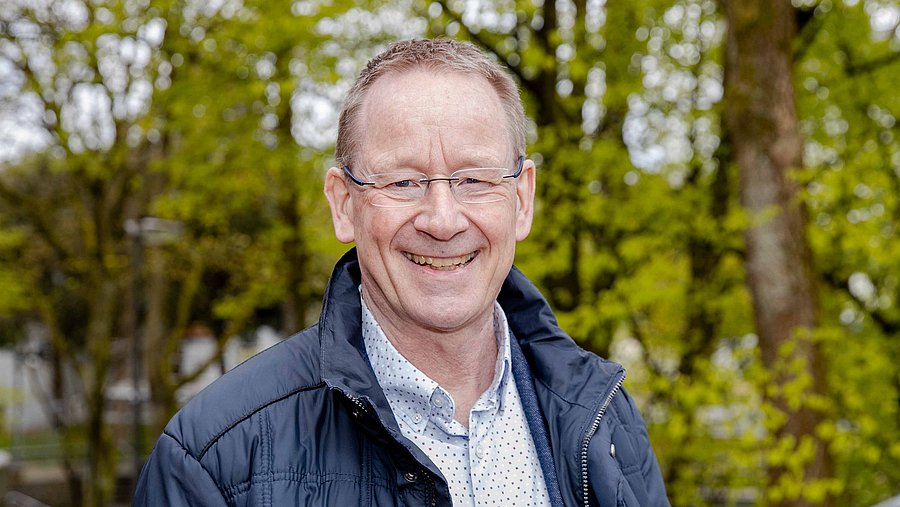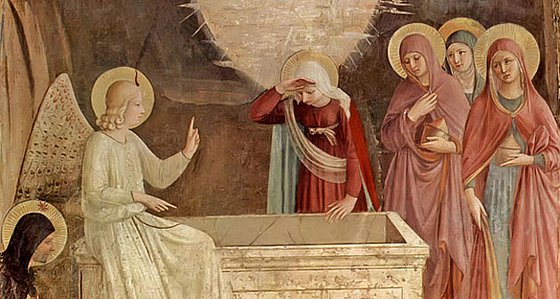
Miracle
Prof. Dr. Kurt Erlemann / Protestant Theology
Photo: Sebastian Jarych
Miracles are fascinating stories of hope against hopelessness
The theologian Kurt Erlemann on the function of testimonies of faith
'There are always miracles...`, sang Katja Ebstein in the 70s. Movies like 'The Green Mile` or 'Lorenzo's Oil`, documentaries and literature deal with miracles again and again. The Bible is full of these stories, so that one could read it uncritically also as a science fiction novel. But miracles have always had a function in our lives, knows Prof. Dr. Kurt Erlemann, who teaches Protestant theology at Bergische Universität.
Miracles are testimonies of faith
"The texts of the Bible are first and foremost testimonies of faith and most of them have, this is important, factual character. They say something happened, and eyewitnesses are also named. These eyewitnesses can be referred to, these people experienced something in faith and then they tell it to posterity." These miracles, he explains, are a constant reminder of God's creative power in all kinds of contexts and seek to inspire hope and faith.
The term miracle encompasses all those events attributed to the intervention of a deity or metaphysical force. "It's a positively coined term," Erlemann says, "it's about a positive twist of fate, triggered by a deity." And this event in space and time, he says, while seemingly contradicting the principles of human reason and experience as well as the laws of nature and history, strengthens every form of hope. "Against all probability and experience, belief in miracles can still turn things around; death does not have the last word."
With rational access, the miraculous is lost
Today's idea of miracles is different from that of earlier times, because it presupposes a knowledge of natural laws, although there was already criticism of miracles in antiquity, the theologian states. "If it was said that someone had raised a dead person, there was always the hypothesis of suspended animation in the room." Today, on the other hand, rational access to reality is quite central and almost has the character of a normative monopoly. For a long time after the advent of the Enlightenment, the church tried to explain miracles rationally. Also a book of the 50's of the 20th century with the title 'And the Bible has nevertheless right' still tries to explain the miracle stories. "The price of these rational explanations, which sometimes read quite bizarrely, is that the miraculous is lost as a result. If I can explain that Jesus walked on the water because he knew the stones that were there in the Sea of Galilee, then that is explained, but the miraculous is gone." Today, people tend to try to 'defuse' miracles, Erlemann explains, by shifting them to a spiritual or psychological level. For example, he says, Jesus didn`t really heal the blind, but helped them gain new knowledge. "He didn't really physically heal the paralyzed, but he -translationally speaking- raised them up anew so that they could go through life with new self-confidence."
The miracle of the parted sea
A well-known example is the miracle of the parted sea. Led by Moses, the people of Israel fled Egyptian oppression and headed across the Sinai Peninsula toward the Promised Land. Pharaoh's troops chase after the Israelites. In a hopeless situation, God stands by 'his' people and divides the waters of the Reed Sea. The fugitives reach the other shore dry-footed. The Egyptians, on the other hand, are swallowed up by the masses of water. In the Bible it says literally: "And the Israelites went into the midst of the sea on dry land, and the waters were a wall unto them on the right hand and on the left." (Exodus 14) Erlemann comments: "The Exodus narrative conveys the memory that the oppressed people of Israel, against all odds, against all resignation, were surprisingly released from Egypt. And this experience is interpreted as a miracle. Again, it would be the wrong way to take historical provability as the criterion for whether what is reported here is in any way credible or true. Historical proof is not demanded, but hope in God is provoked, and that is the point."

The Resurrection of Christ and Women at the Tomb by Fra Angelico (1440 - 1442)
Photo: public domain
The Greatest Miracle: The Resurrection
About 27 miracles are attributed to Jesus in the New Testament. We all know the transformation of water into wine or the raising of Lazarus. The greatest miracle, however, is his resurrection. Here ends for the human mind any possibility of proof. "Yes, in a nutshell, that's so," Erlemann says promptly. "Miracle stories virtually provoke reason and bring God's counterratio into play. Parables give courage; they challenge us to believe the impossible is possible. We can't get out of that either. Either you believe that a miracle happened here, or you don't."
Where do we encounter miracles?
Miracles are always a matter of personal evaluation, he said. "You can always interpret historical events that happen as coincidence, but you can also personally say: for me, this is more! For me this has a deeper meaning, this is a providence or just a miracle." For himself personally, the theologian sees, among other things, the fall of the Berlin Wall as a miracle, because it happened without bloodshed and actually defies all probability. The miracle of Lengede, a mining accident in 1963 that 100 miners survived, or the many small miracles that happen after natural disasters, when living people or animals can still be recovered days later, he explains, "are also miraculous providence for me."
Miracles in teaching
Kurt Erlemann has written a book entitled ' Miracles: Theory - Interpretation - Didactics` on the scholarly treatment of biblical miracle narratives, in which he conveys the miracle texts as stories of hope, faith or protest against the apparent immutability of the world, saying, "Several levels of meaning unlock the richness of the texts. The first level of meaning is the literal, the physical. Someone actually got well, rose from the dead. That is the most difficult to convey. But for me it is the pinnacle of faith in God. So the question is, do I believe in God, the Creator, who can create new life even out of death?" Other levels of meaning, however, are just as important, he said, because every miracle story has several levels, and they can always be spiritual, mythical, cosmological or ecclesiological as well, illustrating this holistic interplay.
Miracles cannot be proven historically, experimentally or scientifically. Nevertheless, Erlemann explains, "They are a theological necessity for me because, this is related to the belief in God, without the belief in miracles one ultimately does not fully believe in the creative power of God. One ultimately deprives oneself of the hope of physical salvation, as it is also laid down in the Bible. But if I cannot believe that Jesus has really risen bodily, then I ultimately deny God the ability that he can do that. And in doing so, I deprive myself of the hope that this will also be granted to us at some point. Miracle texts are fascinating stories of hope against hopelessness."
Miracles happen
Every person has certainly experienced a situation that can also be defined as a miracle. These don't always have to be big events; a miracle can also be found in small things. "What is much more significant for me" says Erlemann, and this amounts to a miracle, "is that I am still able to work healthily and energetically at my age. I experience completely different biographies to my right and left. I can still make plans, too."
And then he tells another very personal story from his family: "My mother was nine years old in 1944 and was sent to after-school care by her mother, where she went every day with joy. But that day she didn't want to go. However, grandma stressed that it was especially important to go to the after-school care on that day, and then she let herself be persuaded. That day there was a single bomb dropped over the town in the area and the family of five siblings, the grandma and another cousin, were all dead. My mother was one of very few siblings to survive. She never really came to terms with that all her life. I often talked to her and always said: 'This is a miracle! It was meant to be. You didn`t want to, but you let yourself be convinced, you went and you survived`. And you made a man happy and brought two wonderful children into the world."
Uwe Blass
Kurt Erlemann studied Protestant theology in Munich, Zurich and Heidelberg. He received his doctorate in 1986 and then worked as a vicar of the Baden State Church and as a school pastor. After his habilitation, he took on teaching positions in Hamburg and Koblenz. Since 1996 he has held the chair of New Testament and History of the Early Church at Bergische Universität.
